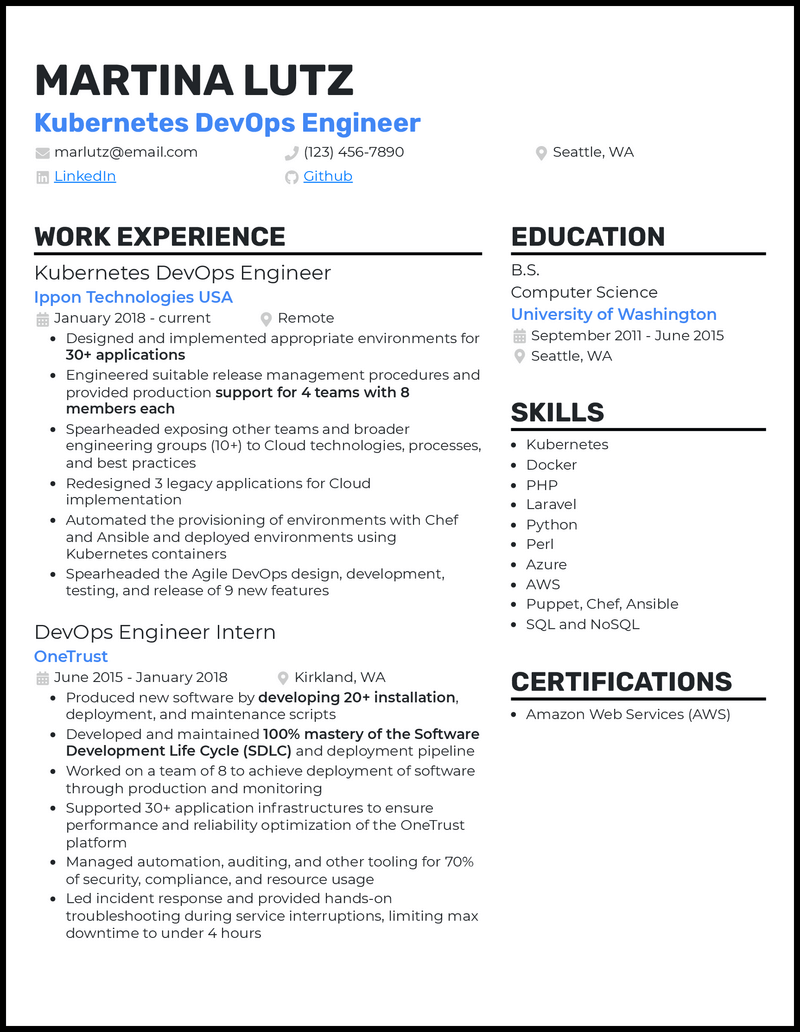Succeeding in Kubernetes roles isn’t just about knowing clusters and containers—it comes down to how you’ve used them to build, scale, and improve real systems.
Here, you’ll know why having a cover letter and a compelling resume that demonstrate your impact can make you memorable to hiring managers.
What you’ll learn here:
- ↪ 5 practical Kubernetes resume templates tailored to different career stages
- ↪ How to stand out by proving the results you delivered, not just the tools you used
- ↪ Clear strategies to secure your dream role in a crowded, competitive market
Related resume examples
How to Write a Kubernetes Resume

Crafting the best Kubernetes resume means proving you can do more than manage clusters—you can deliver measurable results that drive reliability and scale.
Summary
✅Lead with core Kubernetes skills
✅Break down your work experience in action-packed bullet points
✅Position your projects to stand out
✅Boost credibility with education and certifications
✅Tailor to mirror the job posting
This section shows you how to build a resume with the right resume templates so your skills and impact stand out to recruiters and hiring managers.
Key things to cover:
- Core Kubernetes skills and related cloud technologies
- Achievements that boldly show outcomes and measurable results
- Metrics demonstrating you can scale results to achieve intended impact
- Education, certifications, and training that reinforce your expertise
- Projects that highlight hands-on problem-solving and innovation

Summarize your qualifications
Open your resume with a brief profile about you and why you deserve the job. Make it punchy by stocking to what the job advert wants and teasing your strengths.
Example
“Kubernetes Engineer with 7 years of experience building and maintaining containerized environments across AWS and GCP, improving uptime by 28% and reducing infrastructure spend by $1.18M.”
Think of this section as your elevator pitch: it tells an employer, in a quick glance, why you’re worth a closer look.

Unlock your Kubernetes and cloud competencies
Recruiters often use a resume parser before even seeing your application, so your core technical skills should appear early and clearly. Put Kubernetes at the top, followed by related tools and platforms like Docker, Helm, Istio, Terraform, AWS, Azure, and GCP.
If you’re tracking multiple applications with a job tracker, adjust this section to mirror the exact requirements of each job posting. This simple step can improve your odds of making it through automated screening.

Showcase your impressive tech stack
Hiring managers need to know you have a deep understanding of specific skills related to Kubernetes. Show them how your knowledge of Kubernetes enables you to orchestrate containers, effectively manage clusters, and ensure a seamless deployment.
The best way to do this is to show tangible results of specific actions, like how you helped applications scale or how you automated rollbacks and rollouts, highlighting the skills and the software you employed to help you achieve this.
Here are a few skills you can mention:
9 best Kubernetes skills
- Kubernetes
- Docker
- Terraform
- Containerization
- Prometheus
- Amazon Web Services
- CI/CD
- Puppet
- Google Cloud Platform

Bolster your work experience with impactful bullet points
Listing your skills as a Kubernetes developer is good, but showcasing how you’ve applied them in real-world situations is convincing. Identify circumstances from your past organizations where you demonstrated your expertise in Kubernetes.
Validate how you employed Kubernetes to design, deploy, and manage containerized applications. The goal is to highlight the impact of these actions and quantify how they solved a problem.
Don’t worry! It’s simpler than it sounds. Take a look at the following examples for a better understanding of how you can talk about your accomplishments:
- Leveraged Kubernetes infrastructure to streamline the deployment of applications, accelerating time-to-market by 42%
- Increased overall efficiency by 33% by designing clusters to optimize resource allocation
- Enabled real-time visibility into clusters’ health by implementing robust monitoring and logging systems, reducing downtime by 27%
- Developed and managed 150+ complex containerized environments and ensured scalability for multiple applications

Package your experience in measurable achievements
Don’t narrate your responsibilities because nothing can be more boring than that. Instead, build bullet points that pack technical chops, direct results of your contribution, and business value.
Examples:
- Optimized Kubernetes clusters on AWS EKS managing 9,732 pods, cutting deployment time from 43 minutes to 10.8 minutes
- Automated CI/CD pipelines with Jenkins and Kubernetes integrated with GitLab, lowering release errors by 27.6%
- Migrated Java applications into Docker containers orchestrated by Kubernetes, reducing infrastructure costs by $58.7K per year
These figures give hiring managers a clear picture of scale and business value.

Demonstrate a track record of solving real-world problems
Typing out commands alone doesn’t make someone a standout Kubernetes engineer. Want to stand out?
Display your ability to identify real problems, design a practical fix, and see it through to measurable success. Show recruiters that you’ve handled tough challenges or kept systems steady under heavy demand.
Example:
- Resolved ongoing memory leaks in containers with Prometheus and Grafana, improving system uptime by 22%
- Scaled clusters with Helm and HPA during peak holiday traffic, maintaining 99.99% availability under 4.8x load
These concise examples show technical skill and problem-solving under pressure.

Tailor your resume to the specific role
Every Kubernetes role has a different emphasis—some prioritize DevOps automation, others scalability or cost control. Match your resume to the job description by highlighting the most relevant projects, tools, and outcomes.
If you’re applying widely, keep tabs on which resumes you’ve customized. Avoid sending the same generic version to every employer.

Pair your bullet points with strong active verbs
Own everything you did and let your expertise be the focal point. Words like engineered, optimized, automated, scaled, integrated, and secured make your resume feel authoritative.
Example:
- Engineered Kubernetes autoscaling strategies with Terraform and HPA, lowering cloud costs by 14.7% while stabilizing workloads
This approach adds energy and clarity to your experience.

List your education, certification, and relevant ongoing training
This may be a field where what you do is more important than your academic papers. Nevertheless, any relevant training differentiates you from the general pool
Additionally, if you have any, certifications such as below can make you an instant star:
- Certified Kubernetes Administrator (CKA)
- Certified Kubernetes Application Developer (CKAD)
- AWS Certified Solutions Architect
- Google Professional Cloud Architect
Also mention ongoing learning: courses, bootcamps, or open-source contributions. This shows you’re proactive and staying sharp in a fast-changing field.
Top 5 tips for your kubernetes resume
- Start strong
- Add a clear and concise objective or summary statement at the top of your resume to highlight your expertise in Kubernetes. It can attract hiring managers and let them understand who you are, what your goals are, and what you can offer them at a quick glance.
- Present solid results
- Quantifying your achievements helps potential employers understand exactly how much of an impact you made in your previous roles. Use this section to demonstrate how your experience in Kubernetes created desired results, like a 37% cost savings by maximizing resource utilization.
- Customize your resume
- Tailor your resume to every job you apply for by using keywords from the job description to increase your chances of passing an ATS initial screening. For example, if a job calls for a DevOps engineer skilled in using Kubernetes in cloud environments such as AWS, include “Kubernetes” and “AWS” in your resume.
- Mention certifications
- While experience is mandatory, some hiring managers might hold value in showing additional certifications and training.
- Some of the most popular Kubernetes certifications available are Kubernetes and Cloud Native Associate (KCNA), Certified Kubernetes Application Developer (CKAD), Certified Kubernetes Administrator (CKA), and Certified Kubernetes Security Specialist (CKS). These can underscore your proficiency in Kubernetes and related tools such as Helm, Istio, and Prometheus.
- While experience is mandatory, some hiring managers might hold value in showing additional certifications and training.
- Proofread
- With all the time you spend making your resume, you could miss a few errors. Going over your resume with a fresh mind could help you notice small mistakes, like even misspelling “Kubernetes” sometimes. Worse, there’s a chance your resume might not pass the ATS because the keyword it’s looking for is misspelled.

Key takeaway
- Open with your strongest Kubernetes capabilities
- Turn responsibilities into measurable outcomes
- Showcase projects that demonstrate real-world impact
- Reinforce trust by listing certifications
- Mirror keywords and structure from the job posting
Kubernetes Resume FAQs

Providing specific examples of when you used your skills and showcased the results they yielded is the best way to paint a picture of your capabilities. Include points like how you optimized deployment processes or resolved critical issues in production environments and the improvements it brought.
Contrary to what some think, bold colors and graphics on a resume can do more harm than good. Instead of grabbing the attention of a potential employer, they can distract a recruiter from what’s important. Instead, use a clean, minimalistic resume template and add your work experience in reverse-chronological order so your most recent role and accomplishments are at the top.
Emphasize your ability to identify and prevent deployment issues before they occur. Since deployments involve working with cross-functional teams, showcasing your experience collaborating with other stakeholders to troubleshoot and resolve issues can go a long way. This shows employers that you’re reliable and work well in a team, which requires strong communication and collaborative problem-solving efforts.
Predesigned resume templates save your time and ensure that you’re sticking to industry standards. Besides, you have a better chance of beating ATS since you’ll have everything that the job is asking for.
What should a Kubernetes engineer resume look like?
A strong Kubernetes resume should include:
✅A brief, tailored summary at the top
✅A technical skills section with Kubernetes and cloud platforms
✅Work experience backed by measurable results and scale (e.g., pod counts, uptime percentages, cost savings)
✅Education and certifications that prove expertise
✅Optional sections for projects, open-source contributions, or training
Pro tip: Keep the format clean, scannable, and free from unnecessary graphics so it passes both ATS software and recruiter review.




![5 Kubernetes Resume Examples & Templates [Edit Free]](https://beamjobs.wpenginepowered.com/wp-content/uploads/2023/04/kubernetes-standout-resume-example.png)





